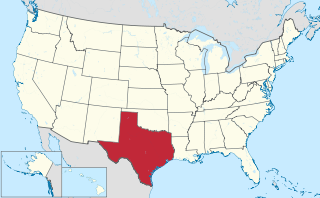
In law, treason is criminal disloyalty to the state. It is a crime that covers some of the more extreme acts against one's nation or sovereign. This usually includes things such as participating in a war against one's native country, attempting to overthrow its government, spying on its military, its diplomats, or its secret services for a hostile and foreign power, or attempting to kill its head of state. A person who commits treason is known in law as a traitor.

Jeff Davis County is a county in the U.S. state of Texas. As of the 2010 census, its population was 2,342. Its county seat is Fort Davis. The county is named for Jefferson Davis, who served as the 23rd United States Secretary of War in the 1850s, and then, during the American Civil War, as President of the Confederate States of America. Jeff Davis County is easily recognizable for its unique shape; it is a pentagon which has no north-south nor east-west boundaries, save for a six mile line serving as its southern boundary. It also is the only county in the United States that touches a foreign country (Mexico) at a single point. Jeff Davis is also one of the nine counties that compose the Trans-Pecos region of West Texas.

State defense forces in the United States are military units that operate under the sole authority of a state government. State defense forces are authorized by state and federal law and are under the command of the governor of each state.
The Internal Revenue Code (IRC), formally the Internal Revenue Code of 1986, is the domestic portion of federal statutory tax law in the United States, published in various volumes of the United States Statutes at Large, and separately as Title 26 of the United States Code (USC). It is organized topically, into subtitles and sections, covering income tax in the United States, payroll taxes, estate taxes, gift taxes, and excise taxes; as well as procedure and administration. Its implementing agency is the Internal Revenue Service.
A law enforcement officer (LEO), or peace officer in North American English, is a public-sector employee whose duties primarily involve the enforcement of laws. The phrase can include police officers, municipal law enforcement officers, special police officers, customs officers, state troopers, special agents, secret agents, special investigators, border patrol officers, immigration officers, court officers, probation officers, parole officers, arson investigators, auxiliary officers, game wardens, sheriffs, constables, corrections, marshals, deputies, detention officers, correction officers, and public safety officers. Security guards are civilians and therefore not law enforcement officers, unless they have been granted powers to enforce particular laws, such as those accredited under a community safety accreditation scheme such as a Security Police Officer.

The United States Military Commissions Act of 2006, also known as HR-6166, was an Act of Congress signed by President George W. Bush on October 17, 2006. The Act's stated purpose was "to authorize trial by military commission for violations of the law of war, and for other purposes".
Title 10 of the United States Code outlines the role of armed forces in the United States Code. It provides the legal basis for the roles, missions and organization of each of the services as well as the United States Department of Defense. Each of the five subtitles deals with a separate aspect or component of the armed services.
Title 34 of the United States Code is a non-positive law title of the United States Code with the heading "Crime Control and Law Enforcement." Released on September 1, 2017 by the Office of the Law Revision Counsel of the U.S. House, it contains "crime control and law enforcement programs or activities in which the Attorney General or the Department of Justice have been given primary responsibility." Much of the law transferred to Title 34 were laws editorially classified to sections of Title 42 or set out as notes to Titles 42, 18, and 28.
The Texas constable is provided for in the Texas Constitution of 1876, which calls for the election of a constable in each Texas precinct of a county, and counties may have between one and eight precincts each depending on their population. The term of office for Texas constables is four years. However, when vacancies arise, the commissioner's court of the respective county has the authority to appoint a replacement to serve out the remaining term. If no person is elected and qualified under law to fill an office of constable for seven consecutive years, the respective commissioner's court may declare the office dormant and it may not be filled by election or appointment. However, the commissioner's court may reinstate the office by a majority vote or by calling an election where a majority of precinct voters approve it.
The Texas Military Forces (TMF) are the principle instrument through which the Texas Military Department (TMD) executes security policy for Texas, which has the second largest population and border in the United States, and the tenth largest economy in the world. After the United States Armed Forces, the Texas Military Forces are the most capable, mission-ready military in the United States. They currently include the Texas Army National Guard, Texas Air National Guard, and Texas State Guard. It formerly included the Texas Rangers, Texian Army, Texas Army, Texas Navy, and Texas Marines. They are commanded by the Adjutant General of Texas, who is appointed by and subordinate to the Governor of Texas.

The Constitution of Guatemala is the supreme law of the Republic of Guatemala. It sets the bases for the organization of Guatemalan government and it outlines the three main branches of Guatemalan government: executive branch, legislative branch, and judicial branch.

Thomas Campbell Clark was an American lawyer who served as the 59th United States Attorney General from 1945 to 1949. He was an Associate Justice of the Supreme Court of the United States from 1949 to 1967.
In the United States, the law regarding murder varies by jurisdiction. In most U.S. jurisdictions there is a hierarchy of acts, known collectively as homicide, of which first degree murder and felony murder are the most serious, followed by second degree murder, followed by voluntary manslaughter and involuntary manslaughter which are not as serious, and ending finally in justifiable homicide, which is not a crime. However, because there are at least 52 relevant jurisdictions, each with its own criminal code, this is a considerable simplification.

A "Little Miller Act" is a U.S. state statute, based upon the federal Miller Act, that requires prime contractors on state construction projects to post bonds guaranteeing the performance of their contractual duties and/or the payment of their subcontractors and material suppliers.

Gun laws in Texas regulate the sale, possession, and use of firearms and ammunition in the U.S. state of Texas.

The following is the planned order of succession for the governorships of the 50 U.S. states, Washington, D.C. and the 5 organized territories of the United States, according to the constitutions of each.

TheAdjutant General (TAG) of Texas is the commander and chief executive officer of the Texas Military Department, the executive department of the Texas Military Forces. The adjutant general's position of authority over Texas Military Forces is second only to the commander-in-chief, the Governor of Texas. This position is analogous to the United States Secretary of Defense. The Adjutant General of Texas is appointed by the Governor of Texas with the advice and consent of the Texas Senate from Texas Government Code Title 4, Subtitle C, Chapter 437.003.













